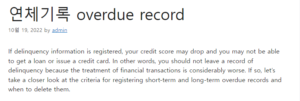If delinquency information is registered, your credit score may drop and you may not be able to get a loan or issue a credit card. In other words, you should not leave a record of delinquency because the treatment of financial transactions is considerably worse. If so, let’s take a closer look at the criteria for registering short-term and long-term overdue records and when to delete them.

Table of Contents
How to check overdue records for free?
What is the difference between clearing overdue information and deleting overdue records?
What are the criteria for registering short-term/long-term overdue records and when to delete them?
Is non-payment of mobile phone bills the cause of lower credit score? 연체기록
How to check overdue records for free? 좋은뉴스
Short-term and long-term delinquency records are barriers to loan approval. If you are going to get a loan, you need to know how to check short-term and long-term delinquency records on your own.
Overdue records are divided into short-term and long-term records. Short-term overdue records can be remembered because they are recent events, but long-term overdue records cannot be remembered because they occurred in the past.
Accordingly, all credit (KCB) and NICE (NICE), the nationally recognized credit rating agencies, provide detailed information on short-term and long-term delinquency records. You can use it for free 3 times a year regardless of whether you are a member or non-member, and you can check it with the credit check result.
KCB Credit Check: How to check all credits for free and raise your credit score in 1 minute
NICE Credit Inquiry: How to check your credit rating for free and raise your credit score in 1 minute
What is the difference between clearing overdue information and deleting overdue records?
Clearing overdue information and deleting overdue records are similar, but have different meanings. For example, if all overdue loans are repaid or all overdue credit card payments are repaid, overdue information is canceled, not overdue record.
In other words, delinquency information is released from the date of repayment of the overdue amount or the date the bond is transferred to another institution, helping to be released from bad credit. Also, your credit score will be restored, but the speed of recovery may be slower because a history of delinquency is left behind.
However, even if overdue information is released, overdue records are not deleted. It is deleted according to three criteria of ‘amount of delinquency, number of delinquent days, number of delinquency’ .
Overdue information release, overdue record deletion process
Overdue payment
List of defaulters
Cancellation of overdue information: Canceled due to overdue payment or a certain period of time has elapsed
Overdue history storage
Deletion of overdue records: Automatic deletion of overdue records due to the elapse of a certain institution
What are the criteria for registering short-term/long-term overdue records and when to delete them?
Overdue information – retention period
Overdue information – retention period
Overdue records are divided into short-term and long-term based on the amount of delinquency and the number of delinquent days. In other words, it is classified into short-term overdue records and long-term overdue records according to the amount and date of overdue delinquency. If it is transferred to a long-term delinquency record, it may be listed on the defaulter list and cause loss in financial transactions.
Short-term delinquency record: In case of repayment of overdue amount after 300,000 won or more, 30 days or more overdue
Long-term delinquency record: In case of repayment of overdue payment after 1 million won or more, 90 days or more
※The number of overdue days is applied based on business days.
Overdue amounts of less than 100,000 won are not classified as short-term delinquent records. There are no restrictions on the number of delinquent days or delinquency cases, there is no effect on credit score, and delinquency records are not shared with credit rating agencies and financial institutions. However, since the financial institution you are dealing with has a record of delinquency, you may incur losses in the loan.
A delinquent amount of less than 100,000 won, more than 5 days of delinquency, and 1 delinquency are not classified as short-term delinquent records. Although it does not affect your credit score, you may suffer losses in financial transactions because overdue records are shared with credit rating agencies and financial institutions.
Is non-payment of mobile phone bills the cause of lower credit score?
Non-payment of cell phone bills hurts your credit score. However, cell phone bills don’t have a negative impact on your credit score. It depends on whether you purchased a mobile phone for self-sufficiency and opened it, or included the mobile phone terminal in the fee.
Overdue call charges and data charges: No overdue records and no impact on your credit score.
Arrears on mobile phone terminal installments: It remains as a record of delinquency, and it affects your credit score.
In other words, your credit score will decline due to the price of your mobile phone device. Seoul Guarantee Insurance guarantees the price of the mobile phone device, and the mobile phone device price is included in the price, so if it is overdue, the receiving and sending will be stopped.
If the delinquency record is passed to Seoul Guarantee Insurance and is classified as a long-term delinquency record, it will be terminated ex officio and you will not be able to open a mobile phone in your name. To delete the Seoul Guarantee Insurance delinquency record, you must pay for the mobile phone device. For related inquiries, please contact the Seoul Guarantee Insurance Customer Center ☎1670-7000.
For your reference, the payment details of telecommunication charges are non-financial information, and you can raise your credit rating if you pay faithfully. For more information, please refer to How to Raise Your Credit Rating Score (+Evaluation Criteria, Calculation Criteria, Score Range).